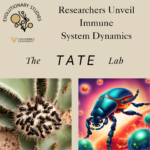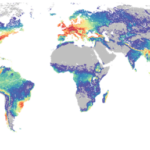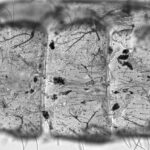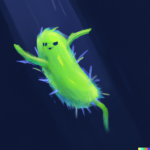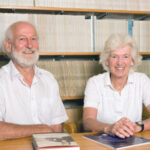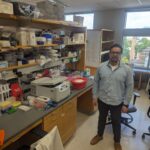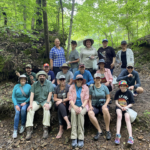Uncategorized
Evolutionary Studies hosts National Academy Member Sharon Strauss for Earth Day
Apr. 2, 2024—By Danielle Bowden, Evolutionary Studies administrative specialist Evolutionary Studies at Vanderbilt is thrilled to announce Sharon Strauss as our keynote speaker for our Earth Day seminar. This seminar, titled, “Evolution and plasticity of the niche, with implications for species coexistence,” will be held in Buttrick 102 on April 17 at 3:30pm. Strauss, Distinguished Professor Emerita...
Insect Immune Insights: Researchers Unveil Immune System Dynamics
Mar. 12, 2024—By Andy Flick, Evolutionary Studies scientific coordinator Justin Critchlow, a recent Ph.D. student in Ann Tate’s lab, just published a paper with the labmates Arun Prakash (postdoctoral researcher), Katherine Zhong (former undergraduate), and Tate, uncovering the intricacies of beetle immune dynamics. The paper was just published in PLoS Pathogens, “Mapping the functional form of the...
Breaking the Mold: Kyle David’s Research Challenges Ecological Norms in Yeast Communities
Feb. 27, 2024—By: Andy Flick, Evolutionary Studies scientific coordinator Kyle David, an NSF postdoctoral fellow in the Rokas lab, and co-authors published a new paper, “Saccharomycotina yeasts defy longstanding macroecological patterns” in the high-impact journal PNAS. This paper, which looks at the ecology of 186 species of yeast, provides evidence that not all life-forms follow the rules....
Vanderbilt University biologists discover that rising temperature accelerates aging in mosquitoes, weakening their immune system
Jan. 25, 2024—By Sarah Ward, Evolutionary Studies graduate communications assistant Climate change may weaken mosquitoes by speeding up aging and slowing down their immune system. A study published January 10, 2024 in PLOS Pathogens by Vanderbilt biology graduate student Lindsay Martin and Centennial Professor of Biological Sciences Julián Hillyer found that mosquitoes age more quickly when temperatures...
Researchers Reveal Insights into Bacterial Genome Evolution
Oct. 15, 2023—By Andy Flick, Evolutionary Studies Scientific Coordinator In a new study led by graduate student Carl Stone and his advisor, assistant professor of biological sciences, Megan Behringer, the team studied the effects of DNA repair pathways on genome-wide methylated DNA adenines (6mA). 6mA is a modification to DNA such that a methyl group is added...
Renowned Evolutionary Biologists Peter and Rosemary Grant to Deliver Inaugural Biodiversity Day Lecture
Sep. 25, 2023—Nashville, TN – Vanderbilt University’s Evolutionary Studies Initiative is thrilled to announce that distinguished evolutionary biologists Peter and Rosemary Grant will be delivering the inaugural Biodiversity Day Lecture as part of the ESI seminar series. The Grants are widely recognized for their groundbreaking research on the evolution of Darwin’s finches, which has transformed our understanding...
Vanderbilt Researcher Illuminates the Impact of Sunlight on Eye Function
Sep. 22, 2023—By: Andy Flick, Evolutionary Studies scientific coordinator A recent study by assistant professor of biology and ophthalmology Gianni Castiglione illuminates our understanding of eye diseases like macular degeneration. The paper, Convergent evolution of dim light vision in owls and deep-diving whales, was published in “Current Biology.” Rhodopsin (RHO), a light-sensitive protein found in the rod...
Carlos Taboada Joins Vanderbilt University and Evolutionary Studies Initiative
Aug. 28, 2023—By: Andy Flick, Evolutionary Studies scientific coordinator Carlos Taboada is the newest member of the Vanderbilt University Evolutionary Studies Initiative. Taboada’s research focuses on the evolutionary biochemistry of animal coloration. In Taboada’s words, “our lab lies at the interface of biochemistry, evolution, and visual ecology. We investigate the mechanisms that explain remarkable optical traits in...
New Avenue for Understanding Antibiotic Resistance Evolution
Aug. 1, 2023—By: Andy Flick, Evolutionary Studies scientific coordinator In a new paper led by Houra Merrikh, the team showed that oxidative stress is a major factor in the evolution of antibiotic resistance in bacteria. The paper, “Oxidative stress drives mutagenesis through transcription-coupled repair in bacteria,” was published in the Proceedings of the National Academy of Sciences....
National Center for Science Education Hosts Conference at Vanderbilt University
Jul. 19, 2023—By: Andy Flick, Evolutionary Studies scientific coordinator The National Center for Science Education supports teachers in accurately conveying what can often be seen as the difficult or even politicized concepts in science. Making strides to help teachers understand topics like climate change and evolution are high priorities for the organization. This year, NCSE chose Vanderbilt...

